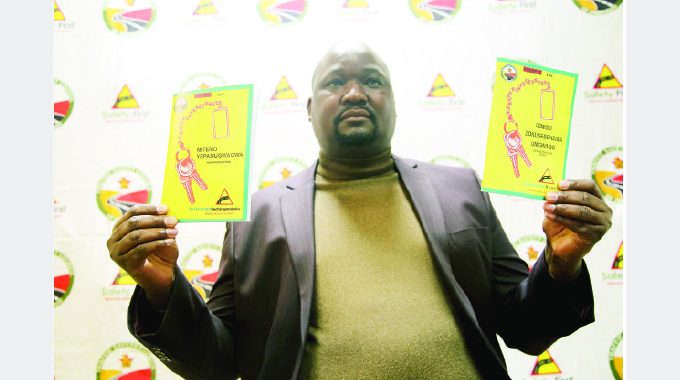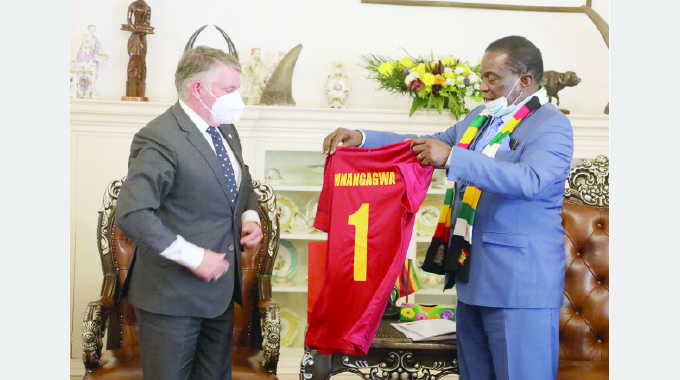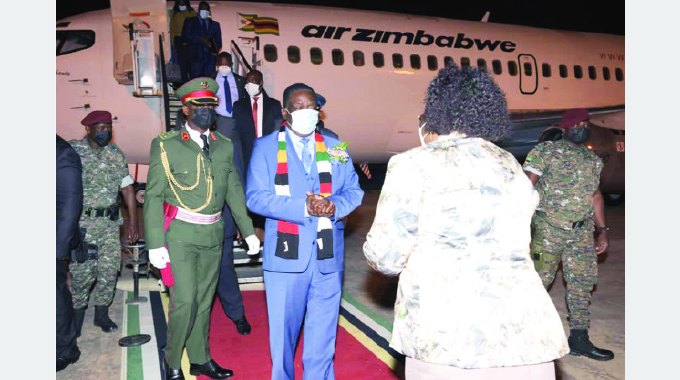Shona, Ndebele Highway Code launched

Freeman Razemba and Trust Freddy
The Highway Code has now been translated into Shona and Ndebele, and printed copies are available at a subsidised cost of US$5 each or the equivalent in local currency while Government is working on translating the code into the remaining 13 other official languages.
Until now the Highway Code was available only in English, even though all road users from drivers to old people and child pedestrians are encouraged to read and study it.
It highlights the main legal points of road use in everyday language and offers a lot of advice that can help keep people safe, or at least a lot safer.
The Highway Code was translated and published in Shona and Ndebele in the spirit of inclusivity and to make it readily available to those who preferred it in their own language or who would understand it better in a more familiar language.
The two editions were then launched yesterday by Traffic Safety Council of Zimbabwe chairperson Mr Kura Sibanda in Harare.
Transport operators, the police and other stakeholders who attended the launch, hailed the Government for the noble idea.
During the ceremony, Mr Sibanda also launched the Heroes and Defence Forces holiday road safety campaigns.
“It is with utmost satisfaction that I announce to you today that we have completed the process of converting the English Highway Code to Shona and Ndebele versions.
“The establishment of Shona and Ndebele version of the Highway Code became a very important factor on the council’s agenda as it was aimed at incorporating everyone in the learning process of the rules and regulations of the road.
“The conversion of this code enabled us to work within the parameters of the National Development Strategy 1 of inclusivity where nobody should be left behind.
“We must work harder to reverse the tide and preserve human lives on our roads. Through collaborative effort, we can find new and creative ways to make decisive interventions in this regard.
“We simply cannot continue using the same tactics that have not worked in the past, hoping to achieve different results. Hence, we embrace the coming in of this innovation of translating the Highway Code into various languages,” he said.
Mr Sibanda said as the country also gears up for the Heroes and Defence Forces Holiday, it was important to highlight the significance of road safety.
“Increased volumes of traffic will be on our roads as the public uses this period to engage in social, cultural and religious activities. As witnessed by the Chimanimani fatal road crash that happened earlier this year, those that travel to church gatherings tend to overload passengers and goods.
“We have also noticed an increased number of unlicenced drivers in ferrying these people to and from church gatherings and conferences. We therefore urge them to avoid overloading and ensure that the drivers responsible for their travels are licenced.
“When travelling at night, we encourage pedestrians to wear bright colours or reflective clothing so that motorists can see them from a distance. We urge all road users to adhere to the rules of the road,” he said.
He said this year’s Heroes and Defence Forces Holiday campaign was running under the theme “Watch the Kilometre Ahead”.
Mr Sibanda also applauded the Ministry of Transport and Infrastructural Development, led by Minister Felix Mhona, for the road rehabilitation programme, which he said will go a long way in reducing accidents.
National police spokesperson Assistant Commissioner Paul Nyathi said police were happy with the launch of the highway code versions.
During the holidays, police will be heavily deployed countrywide to ensure that safety prevails on the roads and they will also be working with various stakeholders including the TSCZ and VID, among others.
Greater Harare Association of Commuter Omnibus Operators vice chairperson Mr Caleb Dominic Bepeta said: “The launch of the Highway Code in vernacular languages of Shona and Ndebele is also a momentous occasion for which we applaud TSCZ and the ministry for achieving. Our drivers are critical and their learning tools need to be available in languages they will understand as this will also assist us in achieving the World Health Organisation decade of action.”
Zimbabwe Union of Drivers and Conductors president Mr Frederick Maguramhinga said as driver representatives they welcome the move as this will ensure that most of their members would be able to acquire drivers licences without facing any challenges.
ZUPCO Harare depot manager Mr Zivanayi Tore said the move would also assist drivers to be able to understand the road rules and regulations.
He said there was also need for all stakeholders on the needful collaborative engagement to thwart avoidable road accidents.
A Harare resident, Mrs Success Gumberu said it was her hope that Government will also quickly translate the Highway Code into the other 13 languages for the benefit of all the people countrywide.
“I would like to applaud the Second Republic for this noble idea and this will help or assist all the people countrywide,” she said.
A motorist, Mr Learn Mufamba said: “This a good move as this will enable our people to understand the rules and regulations of the road better as they will now be in the vernacular. I think the ministry should also move to have an optional provisional license test in vernacular languages as well.”










Comments